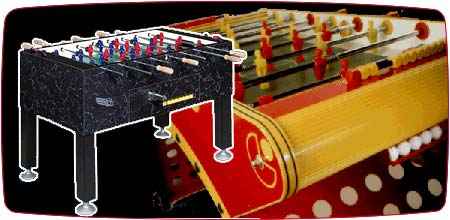Foosball

Retro Coin Op Synopsis
What do Leif Garrett, Homer Simpson and the cast of Friends have in common? A hearty affection for foosball, that’s what. And as Leif well knows, according to his 1981 film Longshot, that foosball affection can sometime turn into…well, foosball obsession.
Like soccer, foosball probably originated in Western Europe during the 1920's, though exactly where and when are subjects of much debate among foos aficionados. France and Switzerland are the usual suspects for early table soccer games, but it was Cincinnati’s own Larry Petterson who officially brought it to the States. Larry fell in love with it when he spent time in Germany, and he smartly decided to import. Back stateside, Larry bought the rights to the term “foosball” and—in an inventive stroke of marketing genius—began selling the coin-op machines as franchise operations during the 1970’s.
Two or four players can play this classic non-electric coin-op, and to do it well, a great deal of skill and timing is required. Players twist and pull several horizontal rods which control a line of soccer players, who then try to kick a ball into the scoring areas situated at each end of the rectangular table.
For the best players, it’s a lot more than just a get-that-darn-ball free-for-all. For these guys, spinning the rods is a big faux pas, but a well-aimed flick of the wrist... now that’s an art. There are intricately choreographed passes and a bible of beloved trick shots, just as there are in an advanced soccer game. Ball control and patience. Strategy and that sense of delectable harmony, which emanates from the board when all your guys are playing together. Now that’s the way the goals are scored.
Today, foosball is played all over the world, and there are tournaments in many countries. But nowhere is the prize money as high and the proceedings as grand as the pro tournaments the U.S.—thanks to a man named E. Lee Peppard, who organized the first official foosball tournament in 1972. It wasn’t long before tournaments were more than just local tavern oddities or college campus romps—they were serious business, with both single player and doubles categories, and participants who traveled from all over the country (and other countries) to compete.
Interestingly, this classic non-electric coin-op is frequently used in rehabilitation centers: physical rehab, so as to help rebuild hand/eye coordination, and, uh, social rehab, too (a.k.a. prison), where it’s frequently a part of the inmates’ recreational programs.
Arcade Game Sub Categories
sportstable games
